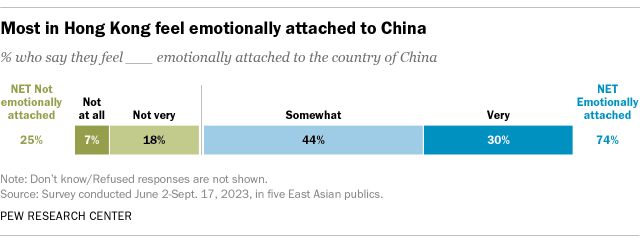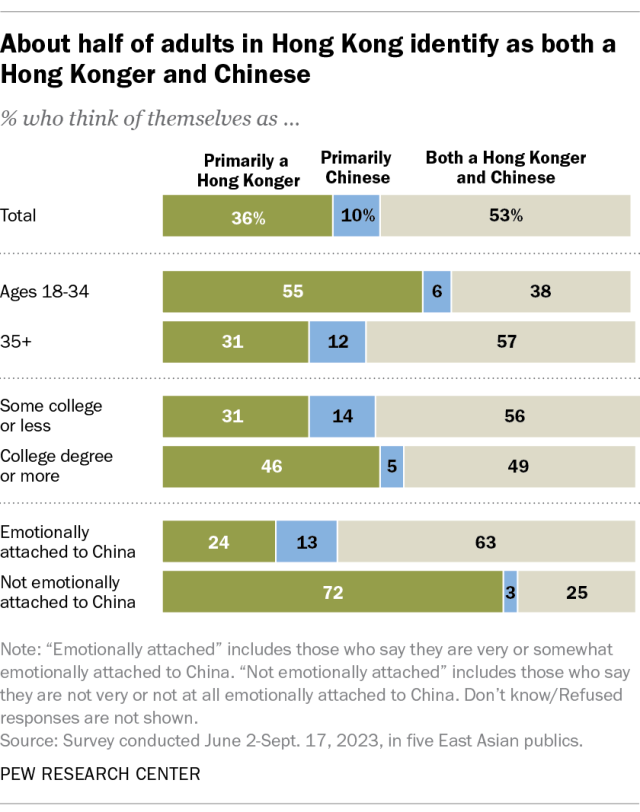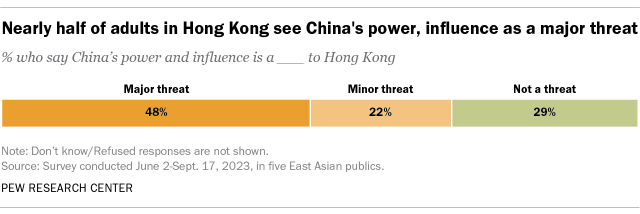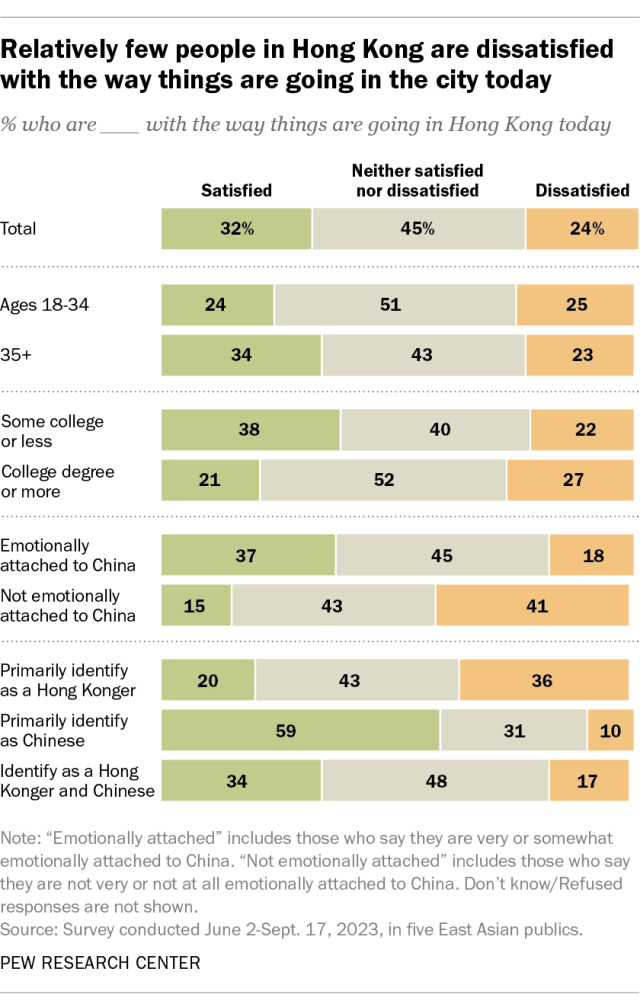Hong Kong, a city of more than 7 million people, is a special administrative region of China – one with its own governing and economic systems distinct from those of the mainland. The city’s relationship with China is often described as “one country, two systems.”
With local elections in Hong Kong approaching, here’s a look at how people in the special administrative region view mainland China, as well as their own identity and the way things are going in their city. All findings are drawn from a recent Pew Research Center survey.
Pew Research Center conducted this analysis ahead of elections in Hong Kong to assess how people there view mainland China, their own identities and their satisfaction with the state of the city.
Data comes from a survey of 2,012 adults in Hong Kong conducted as part of a broader study of attitudes in Hong Kong, Japan, South Korea, Taiwan and Vietnam. The survey was fielded June 2-Sept. 17, 2023. All interviews in Hong Kong were conducted over the phone.
This survey is part of the Pew-Templeton Global Religious Futures project, which analyzes religious change and its impact on societies around the world.
Respondents were selected using probability-based sample designs. The data was weighted to account for different probabilities of selection among respondents and to align with demographic benchmarks for adult populations.
Here are the questions used for the analysis, along with responses, and the survey methodology.
Emotional attachment to China
Around three-quarters of adults in Hong Kong (74%) express an emotional attachment to China. This includes 30% who say they are very emotionally attached and 44% who are somewhat emotionally attached to it.
Hong Kongers ages 35 and older are more likely than their younger counterparts to feel very close to China. Those with less education are also especially likely to feel an emotional attachment to the mainland.

Identity in Hong Kong

When given the choice to identify as “primarily a Hong Konger,” “primarily Chinese” or “both a Hong Konger and Chinese,” adults in Hong Kong are most likely to identify as both (53%).
Around a third of adults (36%) identify as primarily a Hong Konger. Far fewer (10%) solely identify as Chinese.
Hong Konger identity is more prevalent among adults under 35 as well as among those with more education. In comparison, majorities of those ages 35 and older and those with less than a college education consider themselves both a Hong Konger and Chinese. Regardless of age or education, few see themselves as primarily Chinese.
Emotional attachment to China is deeply linked with identity in Hong Kong. Those who say they have an emotional connection to China are far more likely than those without such a connection to see themselves as both a Hong Konger and Chinese (63% vs. 25%) or as primarily Chinese (13% vs. 3%). Conversely, those who lack an emotional bond with China are three times as likely as those with an emotional connection to consider themselves primarily a Hong Konger (72% vs. 24%).
Perceived threats to Hong Kong
Around half of adults in Hong Kong (48%) see China’s power and influence as a major threat to Hong Kong, while another 22% describe it as a minor threat.

In comparison, 37% see the United States’ power and influence as a major threat to Hong Kong, and even fewer (17%) say the same of Russia.
Perceptions of China as a threat differ depending on emotional attachment to the mainland and identity. Those with less of an emotional connection to China are more likely than those with a stronger connection to consider the country’s power and influence a major threat to Hong Kong, as are those who identify as primarily a Hong Konger.
Adults under 35 are also more likely than older adults to see China’s power and influence as a major threat (57% vs. 45%). Views also differ by education: Those with a college education are significantly more likely than those without one to view China as a major threat (63% vs. 39%).
Satisfaction with the way things are going in Hong Kong

Adults in Hong Kong tend to have mixed views of the way things are going there today: 45% say they are neither satisfied nor dissatisfied with the current situation, and only 32% express satisfaction. Roughly a quarter (24%) are dissatisfied.
Satisfaction with the state of affairs in Hong Kong is higher among those who say they are emotionally attached to China than among those who are not. It’s also higher among adults in Hong Kong who identify as primarily Chinese. Around six-in-ten of those who see themselves primarily as Chinese (59%) are satisfied with the way things are going in Hong Kong, compared with 34% of those who consider themselves both Chinese and Hong Konger. Just 20% of those who identify as primarily a Hong Konger are satisfied.
Older adults and those with some college education or less are also somewhat more satisfied with the way things are going in Hong Kong than their counterparts.
Note: Here are the questions used for the analysis, along with responses, and the survey methodology.

